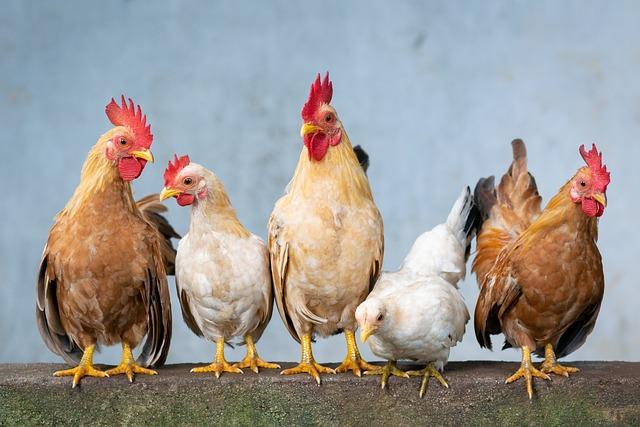In the quiet corners of farms and bustling aisles of supermarkets, the humble egg sits at the heart of a swirling debate. For centuries, it has been a staple in diets worldwide, celebrated for its versatility and nutritional value. Yet, beneath its smooth, unassuming shell lies a complex ethical dilemma: should we stop eating eggs to protect the chickens that lay them? As consumers become increasingly aware of the conditions in which these birds live, a growing movement questions the moral implications of egg consumption. This article delves into the multifaceted issues surrounding the production and consumption of eggs, exploring the balance between culinary tradition, animal welfare, and the evolving landscape of ethical eating. Join us as we crack open this debate, examining whether our love for eggs should be tempered by compassion for the creatures that provide them.
Impact of Egg Production on Chicken Welfare
Chickens raised for egg production often face a range of welfare issues that are largely unseen by the general public. In many commercial egg farms, chickens are confined in small cages where they lack space to move freely, stretch their wings, or express natural behaviors. This crowded environment can lead to severe physical and psychological stress, resulting in health problems and a diminished quality of life.
- Confinement and Space: Battery cages, the most common housing system, provide each chicken with less space than a single sheet of letter-sized paper.
- Health Issues: The intense confinement can lead to conditions such as feather pecking, osteoporosis, and foot problems due to constant contact with wire floors.
- Natural Behaviors: Chickens have a natural inclination to forage, dust bathe, and perch, activities that are severely restricted in conventional egg production systems.
- Emotional Well-being: Studies suggest that chickens are capable of experiencing a range of emotions, and their welfare can be compromised when they are unable to engage in natural social interactions.
As consumers become more aware of these welfare concerns, there is a growing interest in alternative farming practices that prioritize the well-being of chickens, such as free-range or pasture-raised systems. However, these options often come at a higher cost, raising questions about accessibility and sustainability.
Exploring Alternatives: Plant-Based and Lab-Grown Options
As the conversation around animal welfare and environmental sustainability grows, many are turning their attention to plant-based and lab-grown alternatives to traditional egg consumption. The rise of plant-based egg substitutes, often derived from ingredients like mung beans, chickpeas, or soy, provides a cruelty-free option that replicates the texture and flavor of eggs without involving chickens. These alternatives are not only kinder to animals but also offer a lower environmental impact, as they require fewer resources such as water and land.
- Plant-Based Options: These include products like JUST Egg, made from mung beans, and other blends crafted from legumes, which can be used in everything from omelets to baking.
- Lab-Grown Eggs: While still in the early stages of development, these innovative products aim to replicate the exact structure of an egg by culturing cells in a lab, potentially providing an ethical and sustainable solution.
Both plant-based and lab-grown options are gaining traction among consumers who are eager to make a positive impact on the planet and animal welfare. As these alternatives continue to evolve and improve, they may offer a viable path forward for those considering reducing or eliminating their consumption of traditional eggs.

Balancing Nutrition and Ethics in Our Diet
- Nutritional Value: Eggs are a powerhouse of essential nutrients, including high-quality protein, vitamins B12 and D, and minerals such as selenium and iodine. They are versatile and can be a part of various diets, from bodybuilding to keto. However, it’s crucial to assess if these nutritional benefits outweigh ethical considerations.
- Ethical Concerns: The industrial farming of chickens for egg production raises significant ethical issues. Many hens are kept in cramped conditions, with limited space to move, leading to distress and health problems. The debate around whether to consume eggs is further complicated by the practice of culling male chicks, as they do not produce eggs and are considered less valuable.
Finding a balance between nutrition and ethics involves exploring alternatives and making informed choices. Consider options like pasture-raised eggs, which offer a more humane and sustainable approach, or plant-based egg substitutes that mimic the nutritional profile of eggs without the ethical concerns. Ultimately, the decision lies in aligning personal values with dietary needs, fostering a mindful approach to consumption.

Guidelines for Ethical Egg Consumption
When considering the ethical consumption of eggs, it’s crucial to delve into the farming practices behind them. Opting for eggs from pasture-raised hens can be a more humane choice. These hens often enjoy access to open spaces, where they can engage in natural behaviors, unlike those confined in battery cages. Furthermore, supporting local farms or community-supported agriculture programs ensures that you are more connected to the source of your food, potentially allowing you to verify the ethical standards practiced.
Another consideration is the impact on the environment. Industrial egg production can have significant ecological footprints due to waste management issues and high energy consumption. By choosing eggs from smaller, sustainable farms, consumers can help reduce these environmental impacts. Additionally, some farms engage in regenerative agriculture, which aims to restore the health of the land. Consider these aspects when making choices:
- Look for labels such as “Certified Humane” or “Animal Welfare Approved”.
- Research and support brands committed to sustainable and ethical practices.
- Consider reducing overall consumption and supplementing with plant-based alternatives.
Final Thoughts
As we reach the end of our exploration into the ethical, environmental, and health implications of egg consumption, we find ourselves at a crossroads. The humble egg, once a symbol of simplicity and nourishment, now sits at the center of a complex debate that challenges us to rethink our choices and their impact on the world around us. Whether you decide to scramble, substitute, or simply savor your eggs with a newfound awareness, the decision is ultimately yours. As we continue to peel back the layers of our dietary habits, let us do so with open minds and compassionate hearts, mindful of the interconnected web of life that sustains us all. Whatever path you choose, may it be one that aligns with your values and contributes to a more thoughtful and balanced coexistence with our feathered friends.




